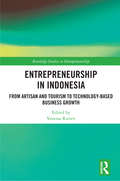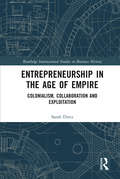- Table View
- List View
Entrepreneurship in Indonesia: From Artisan and Tourism to Technology-based Business Growth (Routledge Studies in Entrepreneurship)
by Vanessa RattenWhilst other countries in Asia particularly China and India have been studied in terms of entrepreneurial endeavors, there is a lack of research on Indonesia despite it being amongst the fastest growing economies in the world. Indonesia is also one of the largest recipients of venture capital in Asia. This book looks at the growth of entrepreneurship in Indonesia from artisan and cultural endeavors to an increased awareness of digital and technology-based forms of entrepreneurship. The book examines the distinct cultural heritage of people in Indonesia towards entrepreneurial pursuits and analyses the role family and minority businesses play in the development of entrepreneurial capabilities. It stresses the need to focus on more categories of entrepreneurship in Indonesia such as artisan, tourism and sustainability in order to facilitate the growth of digital based startups. This book will be amongst the first to explore how Indonesia is leaping ahead of competitors in its quest to be a dominant world power through its entrepreneurial pursuits.
Entrepreneurship in Korea: From Chaebols to Start-ups
by Martin Hemmert Jae-Jin KimEntrepreneurship in Korea offers a fresh perspective on entrepreneurship in Korea by combining a historical review of the achievements of Korean entrepreneurs at each stage of economic development with an analysis of the activities of current entrepreneurs who are at the forefront of the new Korean age. It discusses the crucial role of business entrepreneurship in each stage of Korea’s transformation from an underdeveloped East Asian backwater to a global manufacturing and technology powerhouse throughout the last 100 years. Furthermore, it provides an up-to-date analysis of contemporary start-up entrepreneurship in Korea and discusses its unique characteristics, strengths and weaknesses. Authors identify specific features of entrepreneurship in Korea, why and how business entrepreneurs have been so successful and effective, how their entrepreneurial styles and activities have changed over time, which challenges Korean start-up entrepreneurs are currently facing, and how these challenges may be addressed.
Entrepreneurship in Latin America
by Eduardo Lora Francesca CastellaniThis book looks at both the potential and limits of policies to promote entrepreneurship as an important vehicle for social mobility in Latin America and the Caribbean. Who are the region's entrepreneurs? They tend to be middle-aged males with secondary and, often, tertiary education who represent only a small segment of the economically-active population in the six countries considered in this book. They come from families in which a parent is, or was, an entrepreneur. In fact, a parent's occupation is more important in the decision to become an entrepreneur than a parent's wealth, income or education. Middle class entrepreneurship tends to dominate the sample in part since this is the majority class in society. However, as a percentage of each social class, entrepreneurship tends to be higher in the upper class, followed by the middle and lower classes. Entrepreneurs concentrate in micro-enterprises with fewer than five employees. They enjoy greater social mobility than employees and the self-employed, but this mobility is not always in the upward direction. Entrepreneurs face multiple obstacles including stifling bureaucracy, burdensome tax procedures, and lack of financing, human capital, technological skills, and supportive networks. The support of family and friends, and a modicum of social capital, help them cope with these obstacles to entrepreneurship.
Entrepreneurship in Post-Communist Countries: New Drivers Towards A Market Economy
by Jelena Budak Jovo AteljevićThis volume analyzes the barriers to, as well as new drivers for, entrepreneurial development in post-communist countries. The contributors present various country studies, mainly in the Balkans region, and investigate entrepreneurial behavior and best practices, financial instruments, factors for the success of small and medium-sized companies, and related policy implications. The book will appeal to scholars, policymakers and professionals interested in entrepreneurial obstacles and challenges in the countries of the Balkans region.
Entrepreneurship in Regional Communities: Exploring the Relevance of Embeddedness, Networking, Empowerment and Communitarian Values
by Sujana Adapa Alison Sheridan Subba Reddy YarramFocusing on nascent firms, established growing firms and established plateaued forms within the northern inland New South Wales regional locations in Australia, this book explores the manifestation of entrepreneurship. In particular, the authors examine the state and status of regional entrepreneurship in the bioregions and investigate how gender plays out in the entrepreneurial space. The authors present a detailed macro environmental framework, national and international literature syntheses and the differences between regional and urban businesses exploring the secondary data. Through interviews and primary data gathering, the authors explore the context in which the businesses operate and showcase the uniqueness of regional embeddedness, place-based initiatives, networking opportunities and communitarian values. Insightful reading for anyone interested in the facets regional entrepreneurship and gender studies, this book provides important implications for academic scholars, government officials, business practitioners, financial institutions, and other stakeholders who are involved in effective formulation of innovative business growth strategies.
Entrepreneurship in Renewable Energy Technologies
by Manoj Kumar GhosalThis book focusses on various options of taking up ventures for starting entrepreneurship in small/large scale in the field of renewable energy technologies. The book covers the fundamentals of entrepreneurship, renewable energy resources, their technologies involved and applications along with financial evaluations. The book will cater to the needs of students, researchers, various stakeholders, entrepreneurs etc. by providing valuable information on renewable energy technologies and their applications in developing entrepreneurship and establishing enterprise at individual level, specifically focusing on low carbon technology for sustenance of environment which is becoming increasingly important.
Entrepreneurship in Small Island States and Territories (Routledge Studies in Entrepreneurship)
by Godfrey BaldacchinoEntrepreneurship in Small Island States and Territories is the first publication to consider the ‘creative’ side of enterprise in small island states and territories. Rather than playing out as remote, vulnerable and dependent backwaters of neo-colonialism, the world’s small island states and territories (with resident populations of less than 1 million) show considerable resourcefulness in facing up to the very real challenges of their predicament. The creative endeavours of their residents, facilitated by adroit public policy, has created economic and investment opportunities that translate into some private sector employment and decent livelihoods for many. Their ingenuity, coupled with strategic investments and the support of the diaspora, has led to a suite of (sometimes unlikely) products and services: from citizenship and higher-level internet domain names, to place-branded foods and beverages; from electronic gaming to niche manufacturing. There is much more to small island survival than subsistence farming, aid, remittances and public sector workfare. Entrepreneurship in Small Island States and Territories helps to dispel this myth, showcasing an aspect of life in small island states and territories that is rarely documented or critically reviewed.
Entrepreneurship in South America: Context, Diversity, Constraints, Opportunities and Prospects (Springer Texts in Business and Economics)
by Léo-Paul Dana Christian Keen Veland RamadaniThis book reveals a variety of issues facing entrepreneurs, SMEs, and entrepreneurship development across South America. The authors recognize that when it comes to entrepreneurship, not one size fits all. Therefore, this book has been designed to help business students understand the context of the enterprise. It highlights how countries differ in their scope of entrepreneurship, and how entrepreneurs are impacted by these differences. Each chapter is dedicated to a respective country and describes the status quo, challenges and prospects for entrepreneurship there. Specifically, the book helps students understand the nature of entrepreneurship in Argentina, Bolivia, Chile, Colombia, Ecuador, French Guiana, Guyana, Paraguay, Peru, Surinam, Uruguay and Venezuela.
Entrepreneurship in Spain: A History (Routledge Studies in Entrepreneurship)
by Juan Manuel Matés-BarcoThe figure of the entrepreneur has become a relevant factor that explains the process of growth and economic development. Rising unemployment rates have generated among institutional and private agents, a significant interest in promoting entrepreneurship as a formula to eradicate this social scourge of unemployment. Active policies that favor business culture and initiative are being promoted in all areas. In the university world, academic research has multiplied the work on entrepreneurship, a term that includes a triple meaning: the figure of the entrepreneur, the business function and the creation of companies. This versatile meaning must be based on a consistent theory about the company and the entrepreneur. This book presents specific cases of companies and entrepreneurs that have had their role throughout the history of Spain. The intention is to show the techniques and learning acquired by those agents, which have allowed a considerable advance in the knowledge of the structure and business development. This book brings together the research carried out by its authors with primary sources and makes it accessible to a wide audience—Spanish and Latin American—and will be of value to researchers, academics, and students with an interest in Spanish entrepreneurship, business, and management history.
Entrepreneurship in Technology for ASEAN
by Purnendu Mandal John VongThis edited book focuses on growth and entrepreneurial development in rapidly developing countries in Asia-Pacific region. The book synthesizes the scholarly papers and ideas presented at the 3rd International Conference on Managing the Asian Century, Kuala Lumpur, Malaysia in 2015. It accounts for that fact that entrepreneurs of today are focusing more on technology and that this is happening in so-called Smart Nations. Chapters in the book elaborate on huge gains in innovation in ASEAN, China and India. Gains that are essential for national growth. Some of the issues that are covered include developments in Financial-Data Analysis, Global Healthcare, Geospatial Analysis, Lean Manufacturing, Human Resource, and Big Data and Learning Analytics.
Entrepreneurship in the Age of Empire: Colonialism, Collaboration and Exploitation (Routledge International Studies in Business History)
by Sarah DietzExploring the interplay of politics and commerce in one of the most dynamic periods of British history, this book traces the fortunes of the India and Eastern Trading Company Limited, established in 1906 to finance a jute plantation in Assam, north-east India. In a watershed period for commercial culture, as family capitalism and industrial economics gave way to a predominance of speculative investment and the marketing of ideas, analysis of this London-registered company and its international management forms a lens through which to view the broader socio-political and economic environment of the late-Victorian period to the interwar. Mapping the eclectic bonds that created a network of association between a multinational cast of merchants, company promoters, mining engineers, politicians and industrialists, reveals the multiplicity of strands which coalesced to create one share company. By examining their responses to the opportunities created by colonialism: to enabling legislations and set-backs, to competition and collaboration, internationalism versus rising nationalism, an important era in British history is examined from an entirely fresh perspective. The history of the India and Eastern Trading Company Limited is a tale of cloaked agendas, of land speculation under the guise of colonial agriculture, of German and Russian interests embedded in British-empire prospects, which exposes the intrigues of some of the most infamous imperialists of the era; figures who were the subject of intense academic scrutiny throughout the twentieth century and remain at the forefront of impassioned debate in the twenty first.
Entrepreneurship in the Asia-Pacific: Case Studies
by Jing Wang Hua Bai Ke Xing Michitaka KosakaThis book is dedicated to the analysis of the entrepreneurship in successful companies by presenting and comparing a series of case studies in the Asia-Pacific where many new companies have been growing successfully in the 21th century. In total, 5 cases in the manufacturing industry, 4 cases in the services industry, and 3 cases related to new business and social innovation are chosen from The mainland of China, Taiwan, Japan, Australia, Malaysia and Vietnam. Each case provides insight into the entrepreneur’s aspiration, the processes of personal and business developments, the factors of success, and the inspirations drawn from the analysis. These cases are analyzed and compared from the viewpoints of entrepreneur’s motivation, ability of foreseeing changes and opportunities in the future business environment, core resources and innovation, knowledge management and culture for the company, determination and ethos. These are critical factors in value creation for customers and the society, especially in the future business environment. Finally, commonalities and uniquenesses in entrepreneurship relevant to industry sectors and social-economic-cultural contexts are clarified and a typical entrepreneurship model in the Asia-Pacific is proposed.
Entrepreneurship in the Balkans: Diversity, Support and Prospects
by Robert C. Schneider Veland RamadaniThis book represents a comprehensive state-of-the-art picture of entrepreneurship and small business management issues in the Balkans region. It provides major theoretical and empirical evidence that offers a brighter view of these fields and aims to open up opportunities for greater dialogue in public policy. The readers would be able to enhance their knowledge on small businesses and innovation issues in the Balkans. An outcome of a long lasting endeavour, this book includes contributions of highly reputed authors and experts from the Balkans' countries. Features forewords by two well-known personalities of this field, Leo Paul Dana and Alain Fayolle.
Entrepreneurship in the Creative Industries: How Innovative Agents, Skills and Networks Interact
by Phillip McIntyre Janet Fulton Susan Kerrigan Michael MeanyThis books provides a critical perspective on entrepreneurialism in the creative industries. Split into three sections, the book first asks the contextual question; why, at this point in time, did we arrive at such a focus on entrepreneurship in the creative industries? Examining the historical, social, cultural, economic and political background, the book places the creative industries and entrepreneurship firmly within a systemic approach to creativity and cultural production. Given this emphasis on entrepreneurship in the creative system, the second part of the book asks, what do those who want to work in the creative industries need to do to pragmatically gain an income? The practices, skills, business models and plans necessary to master in order to successfully run a business are explored in this section. The final section contains detailed case studies that reveal the lives of those who found a way to successfully gain an income in the creative industries. It highlights the practical knowledge they gathered, how they negotiated their field of endeavour, and the decisions they made in the real world.Fundamentally the book answers three questions: How and why did we get here? Given that we are here at this point in time, how do we go about being entrepreneurial? And who has managed to do this in the creative industries and how did they do it? Covering both theoretical debates in detail, and practical case studies in key sub-sectors of creative industries, this truly integrative and far-reaching volume will be of interest to students, researchers and practitioners alike.
Entrepreneurship in the Digital Era: Case Studies, Approaches, and Tools for Ecosystems, Business Models, and Technologies (Management for Professionals)
by Daniel Schallmo Jens Pätzmann Thomas ClaußChanges in the environment such as trends, drivers, and influencing factors affect entrepreneurship and intrapreneurship in several ways. The changes of the environmental factors in several dimensions such as political, economic, socio-cultural, technological, ecological, and legal. On the one hand, the environmental changes include risk for existing business models. On the other hand, they include opportunities for new business models, entrepreneurship, intrapreneurship, and new insights in marketing. This book provides empirical and conceptual papers and studies that tackle the challenges and opportunities for entrepreneurship in the digital era. It offers professionals, managers, researchers, lecturers, and students from the fields of entrepreneurship, innovation management, and business development valuable insight into the topic of entrepreneurship in times of digitalization.
Entrepreneurship in the Fourth Sector: Entrepreneurial Ecosystems and Sustainable Business Models (Studies on Entrepreneurship, Structural Change and Industrial Dynamics)
by Conceição Rego Maria Raquel Lucas María Isabel Sánchez-Hernández Luísa Carvalho Adriana Noronha“The fourth sector” is a relatively new sector that consists of for-benefit organizations that combine market-based approaches of the private sector with the social and environmental aims of the public and non-profit sectors. This book examines trends of entrepreneurship in the fourth sector, describes specific ecosystems fostering new ventures around the world, and characterizes the most common and innovative business models. It covers as well the main effects, among others, of technological change, innovation, and institutional behavior on the sector in the last years.
Entrepreneurship in the Global Economy
by Henry Kressel Thomas V. LentoEntrepreneurs have long been drivers of innovation in developed countries. They start companies and create new industries that keep economies strong and prosperous. Today, however, in developing nations such as China, state-controlled economies are building robust industries at stunning speed and siphoning off jobs from the West. How can entrepreneurs function in the face of this challenge? Can they continue to create economic value in a globalized business environment? This book addresses the crucial issue of state planning vs. free enterprise and examines specific problems surrounding entrepreneurship in the global economy through nine case histories of entrepreneurial companies. It also looks at how and why government gets involved in economic growth and how entrepreneurs contribute to economic value. Based on this analysis, the authors argue that companies can succeed, even in controlled economies, by understanding the customs and policies of countries where they do business.
Entrepreneurship in the Global Firm: Enterprise and Renewal (SAGE Strategy series)
by Julian Birkinshaw`A major contribution of this exciting book is the perspective of the subsidiary manager operating network.... In its extreme version this means that all managers are subsidiary managers... challenging those who still view multinationals as hierarchies. With exceptional clarity of thought and writing, Julian Birkinshaw stakes out the ground as a major new thinker in the fields of international business and strategic management ' - Alan Rugman, Templeton College, University of Oxford Much current literature on globalization and competition focuses on the external environment in which firms operate. Julian Birkinshaw's book looks within international firms at the dynamics that affect their growth and position. Are local managers seizing power from the centre? Is `glocialization' the inevitable result of globalization? Based on fresh case evidence gathered in Europe and North America, the findings in this book about multi-national firms and managers make a significant contribution to some of the key debates on the transfer of knowledge in firms; the resource-based view; and the network forms of organization. The initiatives of local managers reflect local knowledge, skills and resources and at the same time impact of the distribution of power in the wider organization. By taking as his perspective that of the subsidiary manager operating in a network, Julian Birkinshaw extends the implications of his findings to all managers in organizations and challenges those who still view organizations as hierarchies.
Entrepreneurship in the Hospitality, Tourism and Leisure Industries
by Michael Rimmington Clare Williams Alison MorrisonEntrepreneurship is the engine that drives any successful industry or economy. In the rapidly evolving hospitality, tourism and leisure sector worldwide this is particularly true. This new text is designed to develop a greater understanding of the process and context for entrepreneurship as well as to provide key concepts which will enable the reader to become more entrepreneurial themselves. The text unites appropriate theory with copious real world examples giving the student, manager or trainer a powerful framework for understanding every aspect of this vital business function. Rigorously developed by authors with wide teaching and industry experience it contains: *Clear learning objectives and teaching structure *Up-to-date cases throughout *The widest possible coverage of the latest research and literature *A clear focus on the dynamic hospitality, tourism and leisure sector.Entrepreneurship in the Hospitality, Tourism and Leisure Industries is an essential teaching tool and reference on all serious academic and professional courses and gives a uniquely powerful overview of the subject for students and trainees.
Entrepreneurship in the Informal Economy: Models, Approaches and Prospects for Economic Development (Routledge Studies in Entrepreneurship #4)
by Mai Thi Thanh Thai Ekaterina TurkinaAlthough entrepreneurship in the informal economy occurs outside state regulatory systems, informal commercial activities account for an estimated 30% of economic activity around the world. Informal entrepreneurship goes unmonitored despite the fact that it significantly contributes to poverty reduction and economic development. As a result, the informal sector is open to unethical practices including corruption, worker exploitation, and natural environment abuse to name just a few. In the media, debates have formed around whether informal entrepreneurship should be assisted or legitimized. Hence, a deep understanding of the phenomenon is vitally important. This book is the first on the market to offer models and approaches to informal entrepreneurship as well as to its prospects for economic development. Offering an in-depth examination of informal entrepreneurship in many different countries, it reveals the motivations for engaging in entrepreneurship in the informal economy, characteristics of informal entrepreneurship, and informal entrepreneurs’ response to ethical issues. This volume illustrates the relationship between formal and informal economies and the conditions for the benefits of informal entrepreneurship to outweigh its disadvantages. And finally, it gives recommendations about when and how the informal economy can be formalized, which sectors should be formalized, and which ones can remain informal. This book offers much-needed guidance for stakeholders involved in economic development programs and scholars and entrepreneurs interested in the field of informal entrepreneurship as it is developing around the globe.
Entrepreneurship in the Informal Sector: An Institutional Perspective (Routledge Studies in Entrepreneurship)
by Colin C. WilliamsHow many businesses start-ups conduct some or all of their trade ‘off-the-books’? And how many enterprises continue to do some of their work off-the-books once they are more established? What should be done about them? Should governments adopt ever more punitive measures to eradicate them? Or should we recognise this hidden enterprise culture and attempt to harness it? If so, how can this be done? What measures can be taken to ensure that businesses start-up in a proper manner? And what can be done to help those enterprises and entrepreneurs currently working off-the-books to legitimise their businesses? The aim of this book is to advance a new way of answering these questions. Drawing inspiration from institutional theory, informal sector entrepreneurship is explained as resulting from the asymmetry between the codified laws and regulations of a society’s formal institutions and the norms, values and beliefs that comprise a society’s informal institutions. The argument is that if the norms, values and beliefs of entrepreneurs (i.e., their individual morality) were wholly aligned with the codified laws and regulations (i.e., state morality), there would be no informal sector entrepreneurship. However, because the individual morality of entrepreneurs differs from state morality, such as due to their lack of trust in government and the rule of law, the result is the prevalence of informal sector entrepreneurship. The greater the degree of institutional asymmetry, the higher is the propensity to engage in informal sector entrepreneurship. This book provides evidence to show that this is the case both at the individual- and country-level and then discusses how this can be overcome. .
Entrepreneurship in the Polis: Understanding Political Entrepreneurship (The Ashgate Plus Series in International Relations and Politics)
by Inga Narbutaité Aflaki Evangelia PetridouDynamics of entrepreneurship have attracted growing attention from scholars of political science, policy studies, public administration and planning, as well as more recently, from the realms of international relations and foreign policy analysis. Under the banner of political entrepreneurship, this volume considers and maps out conceptual approaches to the study of entrepreneurship drawn from these fields, discusses synergies, envisages new analytical tools and offers contemporary empirical case studies, illustrating the diverse political contexts in which entrepreneurship takes place in the polis. Drawing upon an international cast of senior academics and cutting edge young researchers, the volume takes a closer look at key aspects of political entrepreneurship, such as, defining political entrepreneurs, how it relates to change, decision-making and strategies, organizational arrangements, institutional rules, varying contexts and future research agendas. By highlighting the political aspects of entrepreneurship, the volume presents new exciting opportunities for understanding entrepreneurial activities at regional, national and international levels. The volume will be of particular relevance to scholars and students of political science, policy studies, public administration, planning, international relations and business studies as well as practitioners interested in the nexus and utility of entrepreneurship in the modern-day political world.
Entrepreneurship in the Raw Materials Sector: Proceedings of LIMBRA the International Scientific Conference
by Zoltán BarthaThe Entrepreneurship in the Raw Materials Sector proceeding is a collection of papers focusing on the macroeconomic aspects of green growth, the business opportunities in the raw materials sector, and the challenges in entrepreneurship, entrepreneurship training. These papers were presented during the closing conference of LIMBRA (‘Decreasing the negative outcomes of brain drain in the raw materials sector‘), a project funded by EIT Raw Materials in the period of 2019-2021. LIMBRA primarily aims at generating new entrepreneurial ideas in the raw materials sector, and to encourage engineering students graduating in raw materials-related programmes to start their own businesses. This proceeding offers a good summary of our approach, and our results: identify the critical trends in the macroeconomic environment; learn about the specifics of the raw materials markets; develop new business ideas, and rely on your local ecosystem for extra knowledge, mentoring; and finally, help students to "Become stay-at-home entrepreneurs".
Entrepreneurship in the Social Sector
by Jane Wei-Skillern James E. Austin Howard Stevenson Herman LeonardWritten for students and practitioners of social entrepreneurship, Entrepreneurship in the Social Sector is about the opportunity and challenge of applying leadership skills and entrepreneurial talents creatively and appropriately to create social value. This book spans a range of social enterprise activity, using international examples from nonprofit-making to social purpose for-profits settings, with a primary focus on the social entrepreneurial process itself. This casebook is designed to develop knowledge and skills for creating, leading, or supporting social purpose organizations and to achieving maximum impact through social entrepreneurship.
Entrepreneurship in the Third World: Risk and Uncertainty in Industry in Pakistan (Routledge Revivals)
by Zafar AltafFirst Published in 1988 Entrepreneurship in the Third World argues that the substantial theoretical literature on entrepreneurship and small business development really relates to the developed world only and is not applicable to the developing world. It argues that, because of the very different circumstances indeed which apply in the developing world- for example, the less developed banking system or the expectation that breadwinners provide for extended families- new theories of entrepreneurship and small business development need to be generated for the developing world. It goes on to put forward theories here, analysing and presenting a substantial body of original data. It discusses policies which third world countries have adopted to assist small business growth and concludes by suggesting, in the light of the research findings and the theories put forward, how these might be improved. This book will be of interest to scholars and researchers of Pakistani economics, South Asian economics, and business economics.
























